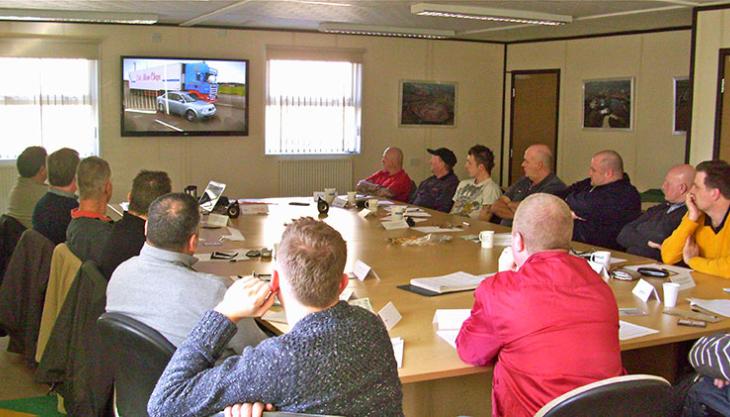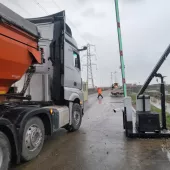Road safety a key priority for MPA

Mineral Products Association says positive steps have been taken but momentum must continue
OVER the past decade the Mineral Products Association (MPA) has supported a huge improvement in the safety of industry employees and, more recently, has been focusing increasingly on improving site contractor safety. The Association has also worked to ensure that the skills and competences of employees should be sustained and enhanced through regular, good-quality training. It is also the MPA’s view that road safety is just as important as site safety and the Association is taking steps to achieve the same high standards in both.
Nigel Jackson, chief executive of the MPA, said: ‘Drivers perform essential roles in our industry; they deliver more than 200 million tonnes of materials and products annually, work on industry and customer sites during loading and unloading, and have an almost full-time interface with the public while using our road network. Driver safety and competence on the roads is absolutely critical.’
It is for this reason, says the MPA, that the Association has worked closely with the Mineral Products Qualifications Council (MPQC) training body to introduce and develop training specifically geared to driver safety. The original EPIC card, now the Driver Skills card, was designed to ensure that drivers received a common level of site safety awareness training and to minimize safety incidents on industry and customer sites. More than 30,000 drivers have been awarded cards to date and it has become an industry standard.
Soon after the introduction of the Driver Skills card (EPIC card) the European Union required the UK to implement the Drivers’ Certificate of Professional Competence (DCPC) and 35 hours of JAUPT-approved training by September 2014, in effect one day of training annually. As a result, MPQC received JAUPT approval for its suite of Driver Skills courses, more recently complemented by a Vulnerable Road User Safety course, developed with the MPA, and these courses have been further improved with input from industry transport professionals.
Updating driver skills and training is as important as other industry training, and there are many good DCPC courses (as well as some that are poor) available to support minerals industry drivers, says the MPA. The Association also believes there is a strong argument for specifying that DCPC training should include elements such as safe loading and unloading, and vulnerable road user safety, but says that, to date, government has not been prepared to take such action to improve the value of the DCPC initiative.
Mr Jackson commented: ‘Without a doubt, drivers – like all other employees and contractors – will be expected to demonstrate their professional competence. Industry customers, increasingly, will expect the delivery supply chain to be effectively and professionally managed, and drivers’ hours will continue to be limited for safety reasons. This process is not going to be reversed and actually provides an opportunity to improve the status of drivers and to highlight their skills and professionalism.’
According to the MPA, HGV safety has, in general, been improving for decades and this improvement has continued in recent years. It says the number of HGVs involved in accidents resulting in deaths and injuries declined in each of the three years from 2011 to 2013, and that for the five years from 2009 to 2013 the accident rate for HGVs was 28% lower than the previous five-year period (rate of injuries per billion vehicle miles). However, the Association says that while there are numerous reasons for these improving trends, the actual number of road fatalities and injuries remains too high.
One statistic that has clearly got worse in recent years, says the MPA, is the number of cyclists killed or seriously injured on UK roads. In both 2012 and 2014 (the latest data) cyclist deaths and serious injuries were 30% higher than the five-year average from 2005 to 2009. Although there are no data indicating how many of these cyclist incidents were the result of collisions with industry HGVs, research in London has indicated a high proportion of cycling fatalities resulted from collisions with construction vehicles.
This general trend explains why there is now a much greater focus on vulnerable road user (VRU) safety training for industry HGV drivers and the fitting of additional safety equipment to industry HGVs. The MPA says both it and its members have taken a leading role in action to improve VRU safety and actively support the Construction Logistics and Cyclist Safety (CLOCS) initiative, which is designed to apply a consistent approach to VRU safety for construction vehicles and deliveries throughout the UK.
Mr Jackson concluded: ‘The many MPA member companies who have taken positive action to improve driver skills and training and add safety equipment to HGVs to protect other road users should be commended. These are really positive steps and it is essential that this momentum continues.’








